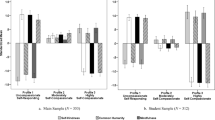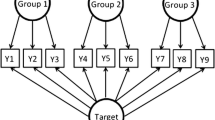Abstract
Assumptions associated with Rational-Emotive Behavior Therapy (REBT) suggest that self-compassion, but not self-esteem, should be incompatible with irrational beliefs and with the emotional disturbances that they produce. In this study, 184 university students responded to a self-compassion scale along with measures of irrational beliefs, self-esteem, depression, and anxiety. As expected, self-compassion correlated negatively with irrationality, predicted better mental health, and explained inverse connections of self-esteem with irrational beliefs. In support of REBT, the irrationality of low frustration tolerance also partially mediated the inverse self-compassion relationship with anxiety. Other findings for self-esteem and for the irrational belief of self-worth, nevertheless, suggested complexities for the REBT conceptual framework. These data most importantly confirmed self-compassion as part of what REBT would describe as an effective personal philosophy.
Similar content being viewed by others
References
Baron, R. M., & Kenny, D. A. (1986). The moderator-mediator variable distinction in social psychological research: conceptual, strategic, and statistical considerations. Journal of Personality and Social Psychology, 51(6), 1173–1182.
Baumeister, R. R., Campbell, J. D., Krueger, J. J., & Vohs, K. D. (2008). Exploding the self-esteem myth. In S. O. Lilienfeld, J. Ruscio, S. J. Lynn, S. O. Lilienfeld, J. Ruscio, & S. J. Lynn (Eds.), Navigating the mindfield: a user's guide to distinguishing science from pseudoscience in mental health (pp. 575–587). Amherst: Prometheus Books.
Costello, C. G., & Comrey, A. L. (1967). Scales for measuring depression and anxiety. Journal of Psychology, 66(2), 303–313.
Crocker, J., & Park, L. E. (2004). The costly pursuit of self-esteem. Psychological Bulletin, 130(3), 392–414.
David, D., Szentagotai, A., Eva, K., & Macavei, B. (2005). A synopsis of rational-emotive behavior therapy (REBT): fundamental and applied research. Journal of Rational-Emotive & Cognitive-Behavior Therapy, 23(3), 175–221.
Davies, M. F. (2006). Irrational beliefs and unconditional self-acceptance. I. Correlational evidence linking two key features of REBT. Journal of Rational-Emotive & Cognitive-Behavior Therapy, 24(2), 113–124.
DiGiuseppe, R., McGowan, L., Simon, K. S., & Gardner, F. (1990). A comparative outcome study of four cognitive therapies in the treatment of social anxiety. Journal of Rational-Emotive and Cognitive-Behavior Therapy, 8(3), 129–146.
Dryden, W. (2013). Unconditional self-acceptance and self-compassion. In M. E. Bernard & M. E. Bernard (Eds.), The strength of self-acceptance: theory, practice and research (pp. 107–120). New York: Springer Science + Business Media.
Ellis, A. (1994). Reason and emotion in psychotherapy. New York: Birch Lane Press.
Ellis, A. (2005). The myth of self-esteem. Amherst: Prometheus Books.
Emmelkamp, P. M., & Beens, H. (1991). Cognitive therapy with obsessive-compulsive disorder: a comparative evaluation. Behaviour Research and Therapy, 29(3), 293–300.
Engels, G. I., Garnefsky, N., & Diekstra, F. W. (1993). Efficacy of rational-emotive therapy: a quantitative analysis. Journal of Consulting and Clinical Psychology, 61(6), 1083–1090.
Garcia, G. M., Watson, P. J., Cunningham, C. J. L., O’Leary, B. J., & Chen, Z. (2015). Narcissism and anger: self-esteem and contingencies of self-worth as mediating self-structure. Interpersona, 9(1), 59–71.
Ghorbani, N., Watson, P. J., Chen, Z., & Norballa, F. (2012). Self-compassion in Iranian Muslims: relationships with integrative self-knowledge, mental health, and religious orientation. International Journal for the Psychology of Religion, 22(2), 1–13.
Hayes, A. F. (2013). Introduction to mediation, moderation, and conditional process analysis: a regression-based approach. New York: Guilford Press.
Hewitt, J. P. (1998). The myth of self-esteem: finding happiness and solving problems in America. New York: St Martin's Press.
Kassinove, H. (1986). Self-reported affect and core irrational thinking: a preliminary analysis. Journal of Rational-Emotive Therapy, 4(2), 119–130.
Kohut, H. (1977). The restoration of the self. New York: International Universities Press.
Lyons, L. C., & Woods, P. J. (1991). The efficacy of rational-emotive therapy: a quantitative review of the outcome research. Clinical Psychology Review, 11(4), 357–369.
Macaskill, N. D., & Macaskill, A. (1996). Rational-emotive therapy plus pharmacotherapy versus pharmacotherapy alone in the treatment of high cognitive dysfunction depression. Cognitive Therapy and Research, 20(6), 575–592.
Mersch, P. P., Emmelkamp, P. M., & Lips, C. (1991). Social phobia: individual response patterns and the long-term effects of behavioural and cognitive interventions. A follow-up study. Behaviour Research and Therapy, 29(4), 357–362.
Muran, E. M., & Motta, R. W. (1993). Cognitive distortions and irrational beliefs in post-traumatic stress, anxiety, and depressive disorders. Journal of Clinical Psychology, 49(2), 166–176.
Muran, J. C., Kassinove, H., Ross, S., & Muran, E. (1989). Irrational thinking and negative emotionality in college students and applicants for mental health services. Journal of Clinical Psychology, 45(2), 188–193.
Neff, K. D. (2003a). Self-compassion: an alternative conceptualization of a healthy attitude toward oneself. Self and Identity, 2(2), 85–102.
Neff, K. D. (2003b). The development and validation of a scale to measure self-compassion. Self and Identity, 2(3), 223–250.
Neff, K. D. (2004). Self-compassion and psychological well-being. Constructivism in the Human Sciences, 9(2), 27–37.
Neff, K. D., & Germer, C. K. (2013). A pilot study and randomized controlled trial of the mindful self-compassion program. Journal of Clinical Psychology, 69(1), 28–44.
Neff, K. D., & Vonk, R. (2009). Self-compassion versus global self-esteem: two different ways of relating to oneself. Journal of Personality, 77(1), 23–50.
Neff, K. D., Kirkpatrick, K., & Rude, S. S. (2007). Self-compassion and adaptive psychological functioning. Journal of Research in Personality, 41(1), 139–154.
Raes, F. (2011). The effect of self-compassion on the development of depression symptoms in a non-clinical sample. Mindfulness, 2(1), 33–36.
Raes, F., Pommier, E., Neff, K. D., & Van Gucht, D. (2011). Construction and factorial validation of a short form of the self-compassion scale. Clinical Psychology & Psychotherapy, 18(3), 250–255.
Rosenberg, M. (1965). Society and adolescent self-image. Princeton: Princeton University.
Russell, D., Peplau, L. A., & Cutrona, C. E. (1980). The revised UCLA loneliness scale: concurrent and discriminant validity evidence. Journal of Personality and Social Psychology, 39(3), 472–480.
Russell, D., Cutrona, C. E., Rose, J., & Yurko, K. (1984). Social and emotional loneliness: an examination of Weiss's typology of loneliness. Journal of Personality and Social Psychology, 46(6), 1313–1321.
Shelley, A. M., Battaglia, J., Lucely, J., Ellis, A., & Opler, A. (2001). Symptom-specific group therapy for inpatients with schizophrenia. Einstein Quarterly Journal of Biology and Medicine, 18(1), 21–28.
Sinclair, S. J., Blais, M. A., Gansler, D. A., Sandberg, E., Bistis, K., & LoCicero, A. (2010). Psychometric properties of the Rosenberg self-esteem scale: overall and across demographic groups living within the United States. Evaluation & the Health Professions, 33(1), 56–80.
Smeets, E., Neff, K., Alberts, H., & Peters, M. (2014). Meeting suffering with kindness: effects of a brief self-compassion intervention for female college students. Journal of Clinical Psychology, 70(9), 794–807.
Wang, C., Jia, F., Fang, R., Zhu, Y., & Huang, Y. (1999). Comparative study of rational-emotive therapy for 95 patients with dysthymic disorder. Chinese Mental Health Journal, 13, 172–183.
Watson, P. J. (2005). Complexity of narcissism and a continuum of self-esteem regulation. In M. Maj, H. S. Akiskal, J. E. Mezzich, & A. Okasha (Eds.), Personality disorders (pp. 336–338). New York: John Wiley & Sons.
Watson, P. J., Biderman, M. D., & Boyd, C. (1989). Androgyny as synthetic narcissism: sex role measures and Kohut's psychology of the self. Sex Roles, 21(3–4), 175–207.
Watson, P. J., Simmons, N. M., Weathington, B. L., O’Leary, B. J., & Culhane, S. E. (2009). Psychometric analysis and tentative shortening of survey of personal beliefs. Journal of Rational-Emotive & Cognitive-Behavior Therapy, 27(4), 201–212.
Author information
Authors and Affiliations
Corresponding author
Ethics declarations
All four authors declare that they have no conflicts of interest. All procedures performed in this study involving human participants were in accordance with the ethical standards of the institutional and/or national research committee and with the 1964 Helsinki declaration and its later amendments or comparable ethical standards. Informed consent was obtained from all individual participants included in the study.
Rights and permissions
About this article
Cite this article
Stephenson, E., Watson, P.J., Chen, Z.J. et al. Self-Compassion, Self-Esteem, and Irrational Beliefs. Curr Psychol 37, 809–815 (2018). https://doi.org/10.1007/s12144-017-9563-2
Published:
Issue Date:
DOI: https://doi.org/10.1007/s12144-017-9563-2




